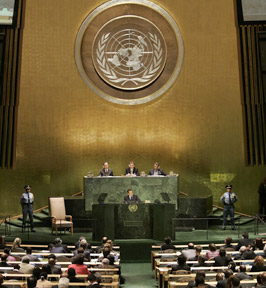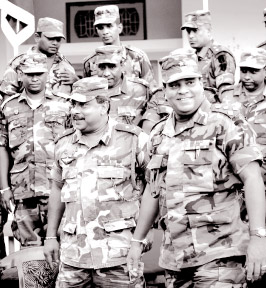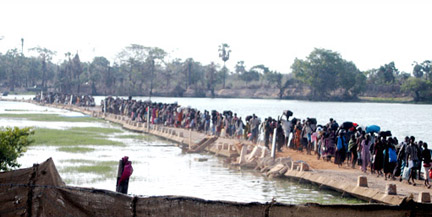Vigilance vital to prevent LTTE resurgence Ė Major General Shavendra
Silva
by Ranil Wijayapala
|

Sri Lanka's Deputy Permanent Representative at the UN Mission in
New York, Major General Shavendra Silva
|
Major General Shavendra Silva, popularly known among the people as
the 58 Division Commander during the battle against terrorism is now the
Deputy Permanent Representative at Sri Lankaís UN Mission in New York.
In an interview with the Sunday Observer, at a time Sri Lanka is
celebrating the fifth anniversary of the great victory it achieved
against the LTTE, Major General Shavendra Silva said that those who were
affected by terrorism will not allow a rise of the LTTE again in Sri
Lanka, but the sympathisers living overseas are trying their best to see
the rise of the LTTE again for their own reasons.
Therefore, he said that Sri Lanka must not wait until the LTTE is a
significant threat again to draw the attention of the international
community and the recent proscription of 15 LTTE front organisations was
an example to this end. He also said that Sri Lanka can prevent a
resurgence of terrorism if it maintains vigilance with regard to LTTE
activities.
Excerpts of the email interview:
Q: Five years have elapsed since that historic day that marked
the total defeat of LTTE terror on Sri Lankan soil. As a ground
commander who was directly involved in defeating the LTTE on the battle
front how do you feel about the difference between the period of terror
and the period after that terror period ended?
 |
| A session in
progress at the UN |
|

Then 57 Division Commander Major General Jagath Dias and the
then 58 Division Commander Major General Shavendra Silva (then
Brigadier) after capturing the LTTE stronghold, Kilinochchi in
January 2009. |
A: I am happy to observe the difference in our country after
the end of three decades of terror. The people are free from the fear of
terrorism and the economy is developing rapidly. We committed ourselves
at the optimum level to overcome the terrorists because we knew that our
country and people will benefit immensely after defeating terrorism. Our
dedication and commitment were critical during the terror period to
eradicate terrorism. Simply put, the fact that the people are living
without the fear of terror is more of an achievement than the prosperity
we enjoy at present.
 |
|
Civilians crossing over to
Army controlled areas during the final stage of the battle
against the Tigers |
Q: Despite the sacrifices made by our heroic soldiers in
defeating the ruthless terrorists there is an internationally backed
operation to make those heroic soldiers villains and to highlight the
terrorists as innocent victims. How do you see this situation?
A: Those who remember the terrorist activities in Sri Lanka
will never say that the terrorists were 'innocent victims'. The
terrorists, their sympathisers, and supporters are the only people who
agree with this description. Having lived abroad during these past few
years I can see very well how reality is manipulated, especially these
days when their ďinternational campaignĒ is trying to gain momentum to
achieve what the terrorists lost on Sri Lankan soil. All service
personnel who were directly involved in defeating terrorism on the
ground, did nothing but their job for the army or their respective
service to the people of Sri Lanka and the country.
Q: We knew that there was international pressure on Sri Lanka
when it was engaged in the battle against LTTE terrorism. Now even after
the defeat of that ruthless terror outfit we are facing much more
challenging situations on the international front. As a former ground
commander and now as a diplomat how do you view these different
scenarios?
A: As I said earlier, the aim of the terror campaign that
failed in Sri Lanka and the international campaign outside the country
are the same. Earlier we received the help of certain countries to
defeat terrorism in Sri Lanka. Now we have to work with a wider range of
countries and with their backing overcome the international campaign
against Sri Lanka. In the terror campaign, it was easy to identify the
adversary. In comparison, there are lots of unknown factors in the
international campaign.
For example, we donít know all the factors that may affect certain
countriesí position regarding Sri Lanka. Many of these countries donít
know in-depth the ground reality in Sri Lanka and what sustained the
terror campaign in Sri Lanka. We need to focus and reach out to these
countries. Some countries are not aware of the real situation but, other
countries turn a blind eye while being fully aware of the real situation
to pursue their own agendas.
Q: As the former General Officer Commanding the 58 Division
who played a key role in defeating the LTTE on the ground you had to
face a challenging situation at personal level when you were appointed
as the Deputy Permanent Representative to the UN. How did you take up
those challenges and what kind of role you are now playing in defending
the country at international fora.
A: Iím stationed in New York where the UN Headquarters is
located. The Permanent Missions of almost all the countries in the world
are based in NY. In addition, there are many NGOs who work with the UN.
I see my primary role as contributing to the Governmentís efforts of
countering the international campaign by portraying the real situation
in Sri Lanka to the UN and representatives of other countries.
I meet a lot of different people and try to reach out to them.
Sometimes, I meet people who know about Sri Lanka and who can understand
the complexity of the situation. I also meet others who have little
knowledge and those who have been misinformed. We sit down with all of
them and put our views across. Also, we try to anticipate negative
developments and try to address them before they become big problems.
Q: What is more challenging - to work as a diplomat or as
military commander?
A: I think both roles have their different sets of challenges
and aims, so it is not fair to compare them. However, I think both roles
require a similar strategic approach to achieve objectives.
I will also add that there are differences in the challenges a
military commander faces in wartime and in peacetime. A war time
commander, especially during high intensity situations such as the last
two years of the conflict in Sri Lanka, is totally different from a
military commander during peace time. A military commander in wartime
has to deal with ever present dangers and the risk of death.
One might think itís just the lives of the troops. But in our
scenario, it was the lives of my own troops, the army, the civilians and
even the terrorists because after all, they are Sri Lankans. Every life
is important. As a military commander, you have to achieve your aim, but
you always consider other factors.
Q: The international media is still trying to find fault with
the Sri Lankan military. Do you think that Sri Lanka has done enough to
counter the allegations specially about the alleged 40,000 civilian
deaths at the final stages of the battle against terrorism?
A: The government has presented its views. But the numbers and
stories our critics use keep onchanging. I donít think the numbers stand
up to scrutiny. But that doesnít stop people from repeating them. We
have to counter these allegations at every opportunity because that is
the only way to put an end to it. If we think we have done enough and
stop our efforts, our critics will come up with something new. So we
have to be always vigilant and not be complacent.
Q: Two resolutions were passed at the UNHRC urging Sri Lanka
to probe into alleged war crimes and allowing the UNHRC to monitor the
progress of those investigations. What is the impact on Sri Lanka due to
these resolutions and how is Sri Lanka reacting at the UN level tothese
resolutions?
A: The resolution was a result of a campaign led by certain
countries. They are still continuing with the campaign. But we will be
working with other countries which understand and support us to counter
the resolution. With the support of these allies, we are trying to reach
out to all relevant parties and keep them informed of the progress, such
as developments in the domestic processes.
We must show them that Sri Lanka is able to solve its own problems
and there is no need for an outside probe. Sri Lanka has said it would
not cooperate with the UN investigations. But we are continuing with UN
projects in several other areas. As to the impact, Sri Lanka will not be
directly affected by the resolutions. However, we have to be cautious
that they donít lead to an indirect outcome.
Q: The recent events (killing of Gobi and two other former
LTTE terrorists) in Sri Lanka prove that there are attempts by the LTTE
rump to raise its ugly head again. How do you analyse those incidents
and do you think that the LTTE is capable of raising its head again in
Sri Lanka?
A: The LTTE in the 1970s began with a few people with
home-made bombs and other crude weapons. But within a few years it
evolved in to a formidable outfit capable of posing a threat to the
State because not enough was done to tackle it militarily.
We have to ensure that the political conditions that permitted the
spread of terrorism do not repeat. For example, the LTTE became strong
not only militarily but also politically after they eliminated all
political leaders and claimed its status as the sole representative of
the Tamil people.
Sadly, terrorism still appeals to some people as a quick solution.
For example, we wonder if some sections of the Tamil diaspora would
still support the LTTE if they were at the receiving end of the LTTE
terrorism. But terrorism only leads to loss of life and destruction as
the 30 years of terrorism showed.
However, those who were affected by terrorism will not allow the LTTE
to rise again in Sri Lanka but sympathisers living overseas are trying
their best to see the rise of the LTTE again for their own reasons.
Q: The Sri Lanka government recently banned 15 Tamil diaspora
organisations as 'LTTE fronts'. How has this been viewed by the UN
Member countries?
A: The government has kept the international community
informed that the proscriptions were aimed at stopping funds flowing
into Sri Lanka from outside connected to terrorist activities.
Some countries in the international community may want to find out
more information as some of the listed personnel are residing in their
countries.
The government has no objection to sharing information on this issue
with foreign governments.
In addition, the proscriptions were in accordance with the relevant
UN Security Council resolutions aimed at suppressing terrorist
financing.
This move is a step that Sri Lanka has to follow as a responsible
member of the international community.
Q: We see that the US has similar views of LTTE activities on
the international front. How can Sri Lanka get international support to
suppress fund raising and the reactivating LTTE internationally?
A: Today, terrorist groups are inter-connected and are
involved in many dangerous activities such as human trafficking and drug
dealing which affects many countries. The LTTE had a vast network
connected to illegal activities that raised funds for terrorism.
We have reason to believe that the LTTE network is still active
abroad even though it was defeated militarily in Sri Lanka. We must not
wait until the LTTE poses a threat again to draw the attention of the
international community. Therefore, whenever we obtain information
regarding such activities we must seek the help of the international
community. An example is the recent proscriptions. We also have to
convince other countries that LTTE activities can affect them too. The
international community is aware that many terrorist movements are not
limited to one country alone.
Q: Do you think that Sri Lanka can contain the LTTE without
allowing it to raise its ugly head again?
A: Sri Lanka can prevent a resurgence of terrorism if it
maintains vigilance on LTTE activities. During the conflict, the LTTE
tried to isolate the people in the Northern and the Eastern Provinces
from the rest of the country because that fitted their agenda for a
separate State.
A whole generation grew up isolated from the rest of the country.
Now, we must make all communities feel that they are part of Sri Lanka.
The government has undertaken to rebuild the infrastructure such as
roads and schools in the Northern and the Eastern Provinces and to
improve the economy of those regions.
Also, the government is implementing the LLRC recommendations on
reconciliation.
Q: You played a key role in the battle front and also in the
diplomatic front. What are your future prospects?
A: Iím an officer from the Sri Lankan Army. Other than the
values and guidance I got from my parents, the main part of my life and
identity was fostered by the army. What I am today is a result of what
the Army did for me. The government appointed me as an Ambassador at a
crucial time to an important location.
I will be returning to the Sri Lanka Army after finishing my
diplomatic assignment. I have always felt that I must give back to the
Army the enormous exposure and the experience I gained while serving as
an Ambassador.
|

